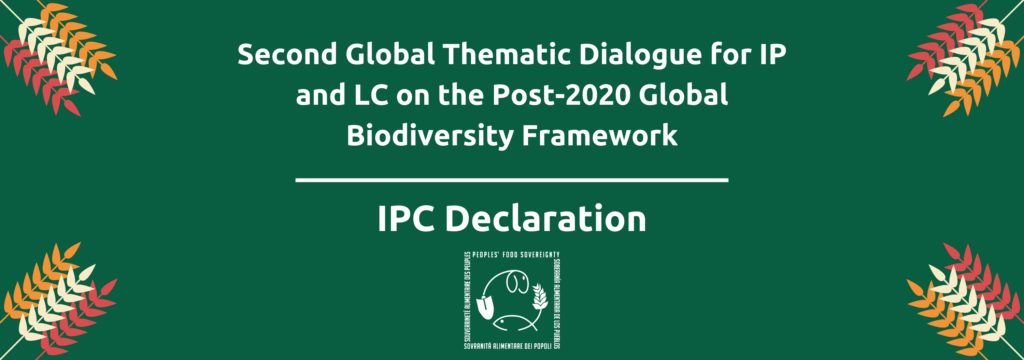January 8, 2021
[vc_row][vc_column][vc_column_text]The IPC participated in the Second Global Thematic Dialogue for Indigenous Peoples and Local Communities on the Convention on Biological Diversity’s Post-2020 Global Framework for Biodiversity, organised to provide Indigenous peoples and local communities with an opportunity to reflect on recent developments in the post-2020 global framework for biodiversity, including the Zero Draft and the monitoring framework. The virtual meeting took place between 1 and 3 December.[/vc_column_text][vc_separator][vc_column_text]
The International Planning Committee for Food Sovereignty (IPC) is an autonomous and selforganised global platform of small-scale food producers and rural workers organisations, Indigenous Peoples and grassroots/community-based social movements whose goal is to advance the Food Sovereignty agenda at the global and regional level. More than 6000 organizations and 300 millions of small-scale food producers self-organise themselves through the IPC, sharing the principles and the 6 pillars of Food Sovereignty as outlined in the Nyeleni 2007 Declaration and synthesis report. We welcome the Regional Dialogues results and hope that we will continue to proceed with increasingly inclusive and participatory consultations. In this sense, we believe that it is crucial to widen participation, fully involving smallholders, small-scale fisherfolk, farmers and pastors. Since data indicate that smallholders manage about 75% of the world’s agricultural land [1] and that Indigenous lands make up around 20 % of the earth’s territory, containing 80 % of the world’s remaining biodiversity [2] – a clear sign that Indigenous Peoples are the most effective stewards of the environment-, we believe it is important to increase and ensure a fully inclusive and participatory consultation process. We, the Indigenous Peoples, are the main protectors of biodiversity worldwide, so it is essential that we are recognised as the main decision makers. Target 20 of The zero draft of the Global Biodiversity Framework says that: “By 2030, ensure equitable participation in decision-making related to biodiversity and ensure rights over relevant resources of Indigenous Peoples and local communities, women and girls as well as youth, in accordance with national circumstances”. We need a more ambitious target – IPLCs should have a leadership position in decision-making.
The participation at all decision-making processes about PGRFA at local, sub-national, national and regional levels should be ensured, and there should be at least 50% women participating; governements should provide resources to Indigenous Peoples’ and peasants’ organizations for capacity building, and to enable attendance to ensure effective participation in decision-making processes. Governments should also establish a dedicated mechanism inclusive of Indigenous Peoples’ and peasants’ organisations on PGRFA within cross-sectoral governing bodies, especially agriculture, education, research, extension and trade, to ensure sustained dialogue between farmers’ organizations and government (including research, extension and educational institutions), and they should ensure that all the documents are disseminated to farmers’ organisations with sufficient time for due consideration in order to ensure effective participation in decision-making processes. There is a strong need to implement measures to this effect at the national level as soon as possible. We also believe that Target 19 should be completely revised. It is against the participation and inclusion of IPs and LCs to recommend that “quality information, including traditional knowledge, should be available to decision-makers and the public for effective biodiversity management…”. IPLCs should have the right and responsibility to guide decisions affecting biodiversity management, rather than having to “make available” traditional knowledge to them with the risk that it will be further exploited and misapplied and decontextualised by policy makers. It should be clear that our target is not 2030, the target is today, it was already yesterday. Finally, ensuring Indigenous Peoples and Local Communities’ inclusion is not just about benefit sharing issue, but it’s about human rights. In rare cases, we have seen a dialogue proposed on the threats that affect IPLCs daily, and this should also be reflected in the GBF: it is essential to address the issues of inclusion and participation, but it is equally necessary to find solutions that address the issues affecting IPLCs through a more holistic approach that recognizes the inextricable link between biodiversity and related cultures and knowledge and that is based on respect for human rights as a key to biodiversity conservation. We hope that the next Global Biodiversity Framework will move away from the classic colonial mind-set of exploiting biodiversity and the traditional knowledge related to it, with an approach that includes and considers the human being as an integral part of an ecosystem, and not as an entity abstract and different from it, as the same goal for 2050, “Living in harmony with nature” seems to suggest today.
Click here to access the PDF version[/vc_column_text][vc_single_image image=”20780″ img_size=”large” alignment=”center” css=”.vc_custom_1610470301037{padding-top: -60px !important;}”][vc_column_text css=”.vc_custom_1610470357798{margin-top: -15px !important;border-top-width: -15px !important;padding-top: -15px !important;}”]
Credits: Gisela Illescas Palma
[/vc_column_text][/vc_column][/vc_row]

